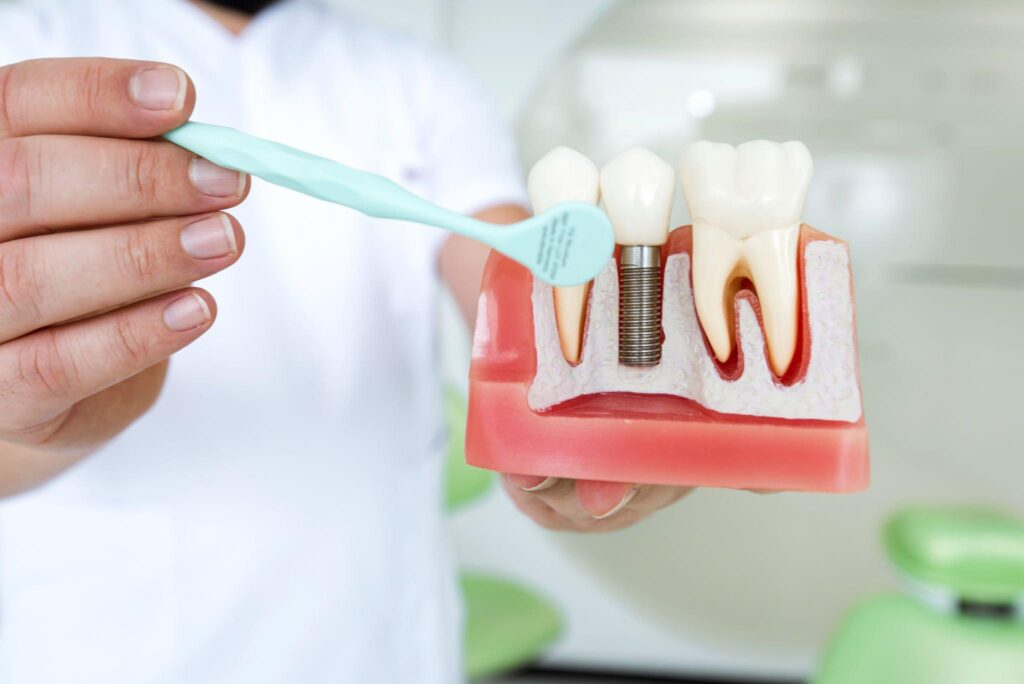During and after dental implant surgery, patients typically experience mild to moderate levels of pain. This can be managed with over-the-counter pain medication and typically subsides within a few days. However, some patients may experience prolonged discomfort, which could be caused by factors such as infection, nerve damage, or sinus issues.
To manage post-surgery pain, options include prescription medication from your dentist, as well as using ice packs and avoiding hard or crunchy foods that may irritate the surgical site. Signs of infection that require immediate dental attention include severe pain, swelling, discharge from the surgical site, fever, or a bad taste in the mouth.
Post-surgery care also includes practicing good oral hygiene, such as gentle brushing and using a prescribed mouth rinse to keep the surgical area clean. It’s important to follow all post-surgery instructions provided by your dentist to ensure proper healing and minimize discomfort.
What are the components of dental implant surgery?

Dental implant surgery involves several key steps. First, the patient undergoes a comprehensive evaluation and imaging to determine the best treatment plan. Next, the oral surgeon prepares the jawbone by placing a metal post, typically made of titanium, into the jaw. This post will serve as the foundation for the implant.
Over the next few months, the process of osseointegration takes place, during which the jawbone fuses with the metal post, providing a strong and stable base for the artificial tooth. Once osseointegration is complete, an abutment is attached to the metal post, and the final artificial tooth is placed onto the abutment.
Dental implants offer numerous benefits for jaw and mouth health. They prevent jawbone deterioration by stimulating the bone and preventing bone loss. Additionally, dental implants provide natural functionality, allowing for comfortable chewing and speaking.
They also restore the natural appearance of the mouth, providing a natural-looking and long-lasting solution for missing teeth. Overall, dental implants contribute to improved oral health and quality of life for patients.
What is the average recovery time for dental implants?
The typical timeline for dental implant recovery can vary depending on the individual’s healing process, but a general guideline is as follows. After the implant surgery, it takes about 3 to 6 months for the implant to fully integrate with the jawbone. During this time, the bone around the implant heals and grows around it, firmly anchoring it in place.
The steps involved in dental implant recovery include initial healing, osseointegration, and finally, the placement of the dental restoration (crown, bridge, or denture). Potential complications to watch for during this recovery period include infection, nerve damage, and implant failure.
After dental implant surgery, patients may experience some discomfort and pain, typically for the first few days. This can be managed with pain medication prescribed by the dentist. Signs of complications to watch for include excessive swelling, persistent bleeding, severe pain, or implant mobility. These could indicate potential issues such as infection, inadequate healing, or implant failure.
To conclude, the process of healing from dental implant procedures typically spans 3 to 6 months, allowing for the implant to integrate naturally with the jawbone, much like natural teeth. During this period, patients may feel discomfort akin to other dental procedures, which can be alleviated with prescribed medications.
It’s crucial to monitor the gum tissue around the implant for any signs of complications. The placement of the dental crown marks a significant milestone in this journey. Regular follow-ups and thorough dental care, starting from the initial implant consultation, play a vital role in the success and longevity of the implant.
FAQ
How painful is getting dental implants?
The pain associated with getting dental implants will vary from person to person and depends on a variety of factors. Generally speaking, the implant procedure itself is relatively minor and painless due to the use of anesthesia during the surgical process. For some individuals, there may be minor discomfort or soreness in the hours after surgery that can be managed with over-the-counter pain relievers.
In addition, patients should also expect some minor discomfort during the entire dental implant process, which includes initial consultation, root canals, jawbone preparation, implant placement, and crowning. It is important to discuss pain management options such as counter medication and alternative therapies with your dentist before undergoing any invasive procedures.
How long will the pain last after dental implants?
The pain associated with dental implants can vary from person to person, and the duration of discomfort is dependent on several factors. Some patients may experience minor soreness for a few hours following the procedure, while others may feel mild discomfort in the days that follow. To lessen this discomfort, it is important to follow your aftercare instructions closely and take any prescribed counter pain relief medication as needed.
What hurts more, tooth extraction or implant?
The answer to this question depends on the individual’s own experience and pain tolerance level. While both tooth extraction and implant placement involve some degree of discomfort, the intensity of that discomfort can vary from person to person. Tooth extraction usually involves a minor surgical procedure, while implant placement typically requires a more invasive treatment.
In terms of pain during the actual procedure, many individuals report feeling minimal discomfort during an implant placement procedure due to the use of anesthesia.
How long does a tooth implant take?
The entire process of getting a dental implant typically takes anywhere from three to six months. This timeline includes the initial consultation, root canals, jawbone preparation, implant placement, and finally, the placement of the artificial tooth roots or crowns. During this period, patients may experience some minor discomfort that can be managed with countermedication or alternative therapies.
It is important to note that any complications during this process could extend the recovery time and require additional treatment.
What are the side effects of having dental implants removed?
The side effects of having dental implants removed may vary depending on the individual and the procedure used. Generally speaking, patients may experience some soreness or discomfort in the area where the implant was removed, as well as minor bleeding. In addition, some individuals may experience complications such as infection or implant failure if the removal process is not carried out properly.
To minimize any potential side effects, patients need to follow their dentist’s instructions carefully and take any prescribed counter.
Do dental implants feel strange at first?
When getting dental implants, it is natural to feel somewhat apprehensive and uncertain. This is especially true for those who have never had the procedure done before. However, with the right care and attention, most patients find that dental implants start to feel like their own teeth quite quickly.
It may take some time for the patient to adjust to the new implant, as it can feel strange or unfamiliar initially. Additionally, there may be a certain amount of discomfort during the healing period, which can make it difficult to adjust. With proper care and time, however, the patient should soon be able to enjoy a new smile that looks and feels natural.






